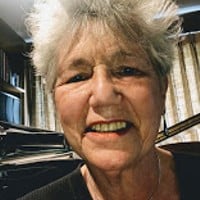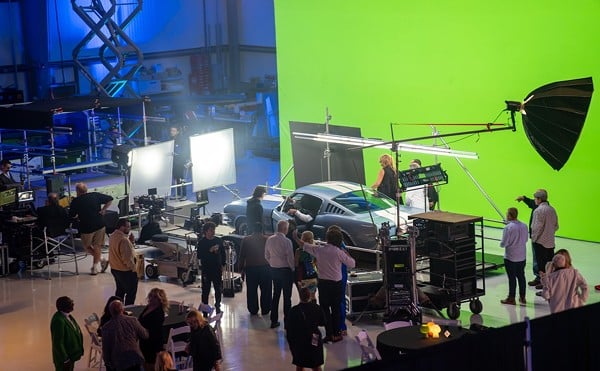I’ll just put it right out there: Blind Injustice is a masterpiece. It is also brilliant theater with a powerful libretto by David Cote; a compelling dramatic score by Scott Davenport Richards, performed with urgency by Cincinnati Symphony Orchestra members under the direction of John Morris Russell; and a superb cast staged by Robin Guarino.
The opera is based on University of Cincinnati law professor and Ohio Innocence Project co-founder Mark Godsey’s 2017 book, Blind Injustice: A Former Prosecutor Exposes the Psychology and Politics of Wrongful Incarceration, a harrowing exposé of the corruption in the criminal justice system that fosters wrongful convictions based on coerced witnesses, confirmation bias and corrupt evidence. Godsey was a successful prosecutor for New York State, but when he first worked with Northern Kentucky University's Innocence Project — which aims to exonerate the wrongly convicted using DNA evidence — he did a 180. In 2003, when he moved to UC, he co-founded the Ohio Innocence Project. Both the organization at NKU and at UC are part of a larger network of Innocence Projects across the country, with OIP being one of the most successful.
KellyAnn Nelson, artistic director the Young Professionals Choral Collective, initiated the process that transformed Blind Injustice into opera. Sixteen members of the YPPC are part of the opera’s chorus, which includes 24 members in total.
Cote’s libretto telescopes four cases successfully argued by the OIP that ultimately freed six people who collectively served over 120 years in prison for crimes they did not commit. It incorporates statements made by the exonerees, excerpts from Godsey’s book and from trial transcripts. Cote’s great achievement is maintaining each character’s humanity without resorting to stereotypes.
Richards’ score is a brilliant fusion of styles covering Minimalism, Hip Hop, Jazz and Blues; his training as an actor also translates into a rare ability to not only make the words sing but also enhance characterizations.
The cast includes 12 performers, many of whom portray multiple roles. Godsey is the model for both the young Prosecutor and the Defense Attorney who frequently spar throughout the opera. The Prosecutor revels in his power, proclaiming “You need me! I will always win!” in his opening music. Sung with obnoxious youthful arrogance, Joseph Lattanzi embodies the legal system’s obsession with winning rather than with justice. Samuel Levine as his alter-ego, the Defense Attorney, is equally passionate.
The exonerees draw heartbreaking and inspirational performances from the young cast. Maria Miller is Nancy Smith, a bus driver for a Head Start program in Lorain County who served 14 years on charges of sexual abuse of children on her bus. Tenor Thomas J. Capobianco portrays Clarence Elkins, who served seven and a half years for the rape and murder of his mother-in-law and the molestation of his niece. Terrence Chin-Loy, Sankara Harouna and Miles Wilson-Toliver are Laurese Glover, Derrick Wheatt and Eugene Johnson, also known as the East Cleveland Three, who served 20 years for a murder based on evidence from a coerced witness. Eric Shane sings Rickey Jackson, who served 39 years for murder based on false testimony.
Singing Derrick Wheatt’s mother, Deborah Nansteel's anger-fueled lament is all too real. Victoria Okafor is Alesha, the OIP attorney whose righteous indignation propels her even as the legal system disgusts her. Morgan Smith turns in a frightening portrayal of serial rapist and killer Earl Mann; his cellmate, Edward Vernon, is played by Joseph Parrish.
The chorus serves as the voices of children coerced into repeating what parents want them to say, as cell-block prisoners and the voices of us all. They are powerfully present throughout.
Guarino’s ingenious staging is the best work I’ve ever seen from her. Scenes flow organically along a dramatic arc that is always focused on the endurance of the human spirit even when faced with despair and horror. Though the staging is physically demanding, Guarino understands singers and they respond memorably.
Andromache Chalfant’s stage design transforms Music Hall's Wilks Studio into a meta-courtroom with bleacher seats that flank either side of the stage. A long table appears periodically, functioning as a court desk or a prison interrogation space.
The final ensemble is a genuine tour de force. The opera begins with the Prosecutor asking, “What makes a person a criminal?,” and ends with the ensemble singing, “What makes a person endure years of injustice?” The music builds from a theme heard as Clarence Elkins schemes to get DNA from Earl Mann, who he knows is the real murderer of his mother-in-law. And the Prosecutor, who could have devolved into a caricature of self-righteousness, sings, “If I doubt, I can’t do my job. And if I can’t do my job, no one in the room is safe.” He may be deluded by his power, but he’s allowed to be human.
The only negative is the Wilks Studio, with a seating capacity that limits the total audience of the entire performance run to less than 1,000. This is a piece that must be seen and heard throughout the state and the nation.
Blind Injustice is proof positive that opera can bear powerful witness to the social issues of our time, as well as to the strength of the human spirit in the face of mindless injustice.
At the conclusion of a Q&A session held prior to the performance, exoneree Jackson was interviewed by Japanese NHK television, members of which were there filming a documentary. He was asked how he maintained remained so upbeat after nearly 40 years in prison. “Well, you know, there are a lot more good people out there than bad,” he replied.
He puts us all to shame.
Performances of Blind Injustice are sold out. More info: cincinnatiopera.org.







